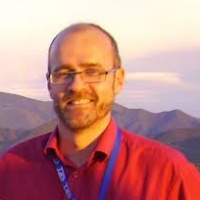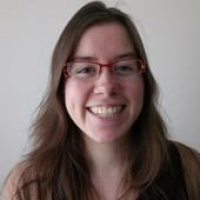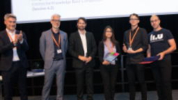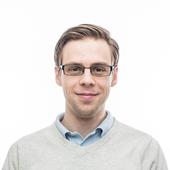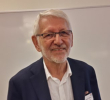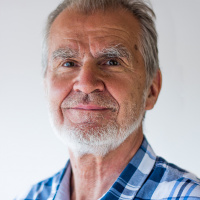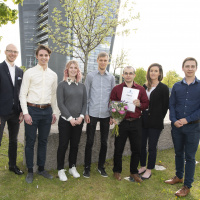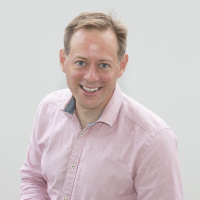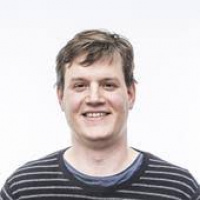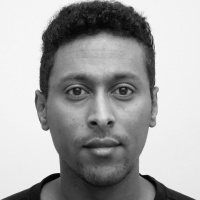News 2019
Anders Nordgaard appointed honorary doctorate at Lund University 2020
Anders is an adjunct senior lecturer at STIMA/IDA and has for many years worked
closely with Lund University. Anders' research is about robustness in forensic
evidence, and is conducted in collaboration between Lund University and the
Swedish National Forensic Centre (NFC).
Read more
Best paper award at UCC
The best paper prize at the international conference on Utility and Cloud
computing (UCC) was awarded to a paper on performance aspects of mixed reality
within edge networks. The article was presented by Klervie Toczé and it was the
result of a collaboration with Johan Lindqvist, a former IT student.
Read more
Robust stream reasoning under uncertainty
Information is everywhere. Much of this information is now produced and
consumed as information streams. We make online voice calls, watch videos, and
live-stream events. Surveillance cameras collect and transmit live footage.
Sensors allow us to check the temperature. Stock market information allows us
to check on the state of the worldwide markets. Our smartphones can give us
live position information that can be shared with others. And robots sense
their environment through their sensors, similar to how humans perceive their
surroundings. All of these information flows give us imprecise and incomplete
snapshots of the world we reside in. The amount of information can make it
difficult to make sense of it all. A highway traffic controller may have
hundreds of cameras, for example. But the digital integration of our world does
not stop here, with smart cities and the internet of things being actively
pursued. In his thesis, Daniel de Leng focused on two parts of this stream
reasoning problem; how to handle uncertainty when reasoning over streams, and
how to robustly generate those streams.
These two parts were integrated into a single stream reasoning framework that
is designed to handle both reasoning about the information contained within
streams as well as the streams themselves as products of a synthesis process.
This ability will become increasingly important as more and more information
streams are generated.
Read more
SWSA 10-years award
Olaf Hartig has received the 10-Years Award of the Semantic Web Science Association. This annual award recognizes a research paper that has become the most influential work of all papers published ten years ago in the respective edition of the International Semantic Web Conference (ISWC). The ISWC 2009 paper for which Olaf has now won the award started a line of research that focuses on evaluating database queries directly over interlinked data on the Web. In this context, Olaf's paper pioneered the idea to integrate a traversal-based discovery of relevant data sources into the query execution process, and the paper introduced a first concrete approach to implement this idea in a query execution engine. Since its publication, the paper has spawned numerous other scientific work that proposed alternative approaches, established theoretical foundations of queries and query languages in the given context, and combined the ideas with other forms of query processing. For a brief overview of this research area refer to a recent encyclopedia entry co-authored by Olaf.
Best Paper Award SEMANTiCS 2019
Robin Keskisärkkä and Olaf Hartig won the Best Paper Award for their paper
"RSP-QL*: Enabling Statement-Level Annotations in RDF Streams"
co-authored with Eva Blomqvist and Leili Lind (from RISE)!
Read more
Different ways of looking at how services change
After a long week at the office it might be nice to collapse on the couch and
stream a film, to not have to cook but order take-out food instead. If you are
not feeling well, it’s a reassuring idea that you can contact a doctor. In the
course of our lives we use countless services, both through digital channels
and face-to-face. At the same time, much is still unknown about how changes in
services actually come about and how they can be successful. In his thesis, Tim
Overkamp has developed two ways to frame and address how services are
transformed, how service practitioners can work to change services and how
designers can contribute to these changes.
The first way to see the implementation of service transformation builds on
process models for product development, where concept design happens in an
early phase and changes are realised in a later production phase. Service
transformation then means that a service concept is designed first and that the
prerequisites for rolling out the service are created once the service concept
is defined. Designers can contribute to changes by applying implementation
strategies while they are involved in a service development project. For
example, developing support for implementing the outcomes of the project in the
organisation by involving those who will work on implementation earlier in
service development, to create ownership and buy-in. furthermore, is designers
are hired as consultants, they can facilitate implementation by supporting the
handover of the designed service concept to their client organisation. For
instance, by helping the organisation translate the abstract service vision
into concrete actions and steps towards realising the service.
The other way of looking at realising services builds on the idea that services
are a collaboration between people who use their skills and knowledge to help
each other. In this framing, changes in services lead to changes in the roles
and relationships between actors in the service. These changes take place in an
ongoing way. Designers can contribute by supporting service actors in learning
what the relationships between service actors look like and the possible
effects of changing the roles of service actors.
Through these two views of service transformation, we know a bit more about
what the work that goes into allowing us to stream our favourite films and
series or to seek medical help can look like.
Read more
Scalable dynamic analysis of binary code
A lot of software - both benign programs and malware - is distributed only as
binary code, that is, in the machine-readable format used by the computer's
processor. Therefore, powerful methods for analyzing binary code is required.
In his thesis, Ulf Kargén has developed scalable methods for so-called dynamic
analysis of binary code, and presented two applications in security testing of
software.
Read more
R. Duncan Luce Outstanding Paper Award
Oleg Sysoev together with his co-authors is a winner of the Society for
Mathematical Psychology award for the most outstanding paper published in the
Journal of Mathematical Psychology in 2016-2019:
M.L. Kalish, J.C. Dunn, O.P. Burdakov and O. Sysoev (2016). A statistical test
of the equality of latent orders. Journal of Mathematical Psychology, 70, 1-11.
Read more
Harold “Bud” Lawson, a co-founder of IDA, passed away on June 10, 2019.
Bud was a pioneer in computing technology and he made several significant
contributions to the industrial and academic sectors. During his long career,
he participated in several pioneering developments in software, hardware,
computer-based systems and international standards. For his invention of the
concept of pointer variables in programming languages, he was awarded the
prestigious IEEE Computer Society’s Computer Pioneer Award in 2000. He also
received the IEEE Simon Ramo Medal for his pioneering contributions to computer
systems, systems engineering, and standards, in 2019. He was a Fellow of ACM,
Fellow and Life Member of the IEEE, and Fellow of the International Council on
Systems Engineering INCOSE.
Bud came to Linköping in the early 1970s as a consultant to Datasaab. In this
role he developed the incredibly innovative FCPU concept for computer
architecture. In 1979, he was appointed full-time Professor of Computer Systems
at Linköping University, and he became a member of the Department of Electrical
Engineering (ISY). In 1983, he left ISY in order to co-found the Department of
Computer and Information Science (IDA) together with Erik Sandewall and
Eva-Chris Svensson. During his years at IDA, he started and led the CADLAB
research group. Bud always maintained strong contacts with industry both in
Sweden and abroad, and he was also an early promoter of international academic
cooperation, in particular through his initiative for a Swedish International
University. He later left IDA in order to do independent consulting from his
new home in Stockholm.
We remember Bud for his important contributions to science and to education,
where he was often at the very forefront of the field, and sometimes well ahead
of it. We also remember him for his character as a very good friend and
colleague, for his sense of humour and his persistent optimism, and for his
thoughtful and constructive approach in all his initiatives.
Henrik Eriksson Zebo Peng Erik Sandewall
An additional 20 million for further training within AI
Last year, the Swedish government invested 20 million in continuing education
within AI, and in 2019 another 20 million.
Chalmers University of Technology will coordinate the venture, with the
University of Gothenburg, KTH Royal Institute of Technology, Linköping
University, Lund University, Umeå University and Örebro University
participating.
Read more
Erik Sandewall becomes "jubeldoktor"
Uppsala University will during their Commencement Ceremony 2019 present Erik as one of their "jubeldoktorer" as it is 50 years since he defenced his PhD thesis and became a PhD.
Master thesis prize for 2018
The twentieth prize ceremony for the best Master thesis within the broad area
of IT took place in collaboration with the Computer Society (East). Among the
seven very strong theses nominated Mohammad Khodari with a thesis project at
Scania was awarded.
Read more
New member of IVA
Fredrik Heintz has been elected into the Royal Swedish Academy of Engineering
Sciences (IVA).
Read more
Traumatic Bleeding Control
Erik Prytz has, in collaboration with the center for disaster medicine and
traumatology, participated in several research project related to traumatic
bleeding control.
These projects have now received some media attention, and you can find both a
web-based story as well as a longer interview on SVT Play.
Other links:
https://www.svtplay.se/video/21710598/lokala-nyheter-ost/svt-nyheter-ost-1-apr-21-46?start=auto&tab=2019
På LiU:
https://liu.se/artikel/kmc-stop-the-bleed
Read more
Best Thesis
Måns Magnusson's thesis "Scalable and Efficient Probabilistic Topic Model
Inference for Textual Data" has been awarded the annual Cramér prize for Best
Thesis in Statistics and Mathematical Statistics. The prize is given annually
by the Cramér Society, the academic section of the Swedish Statistical
Association.
Read more
Automatic and Explicit Parallelization Approaches for Equation Based Mathematical Modeling and Simulation
Mahder Gebremedhin investigated in his PhD thesis how to take advantage of the
potential computational power provided by modern multi-core processors to
improve the performance of mathematical simulations, especially for models in
the Modelica modelling language and corresponding tools.
He has studied and developed methods for both automatic and explicit
parallelization approaches. The methods investigated, and the tools developed
enable modelers and engineers to utilize the multi-core capabilities of their
modern computers with relatively low or even no extra effort.
Read more
Tryggve Holm Medal 2018
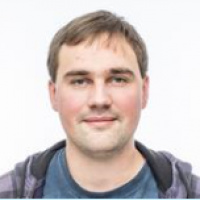
Filip Strömbäck, IDA, has been awarded the Tryggve Holm Medal for the year
2018. The medal with the associated diploma is awarded to graduates with
particularly good study results, at various degree programs at LiTH, and is
part of donated funds that are intended to promote technical research and
education.
Read more
Page responsible: Webmaster

